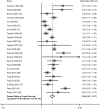Early detection, curative treatment, and survival rates for hepatocellular carcinoma surveillance in patients with cirrhosis: a meta-analysis
- PMID: 24691105
- PMCID: PMC3972088
- DOI: 10.1371/journal.pmed.1001624
Early detection, curative treatment, and survival rates for hepatocellular carcinoma surveillance in patients with cirrhosis: a meta-analysis
Abstract
Background: Surveillance for hepatocellular carcinoma (HCC) has level I evidence among patients with hepatitis B but only level II evidence in patients with cirrhosis. This lack of randomized data has spurred questions regarding the utility of HCC surveillance in this patient population; however, lack of randomized data does not equate to a lack of data supporting the efficacy of surveillance. The aim of our study was to determine the effect of HCC surveillance on early stage tumor detection, receipt of curative therapy, and overall survival in patients with cirrhosis.
Methods and findings: We performed a systematic literature review using Medline from January 1990 through January 2014 and a search of national meeting abstracts from 2009-2012. Two investigators identified studies that reported rates of early stage tumor detection, curative treatment receipt, or survival, stratified by HCC surveillance status, among patients with cirrhosis. Both investigators independently extracted data on patient populations, study methods, and results using standardized forms. Pooled odds ratios, according to HCC surveillance status, were calculated for each outcome using the DerSimonian and Laird method for a random effects model. We identified 47 studies with 15,158 patients, of whom 6,284 (41.4%) had HCC detected by surveillance. HCC surveillance was associated with improved early stage detection (odds ratio [OR] 2.08, 95% CI 1.80-2.37) and curative treatment rates (OR 2.24, 95% CI 1.99-2.52). HCC surveillance was associated with significantly prolonged survival (OR 1.90, 95% CI 1.67-2.17), which remained significant in the subset of studies adjusting for lead-time bias. Limitations of current data included many studies having insufficient duration of follow-up to assess survival and the majority not adjusting for liver function or lead-time bias.
Conclusions: HCC surveillance is associated with significant improvements in early tumor detection, receipt of curative therapy, and overall survival in patients with cirrhosis. Please see later in the article for the Editors' Summary.
Conflict of interest statement
The authors have declared that no competing interests exist.
Figures
Comment in
-
Surveillance for hepatocellular carcinoma with ultrasound and AFP is associated with improvements in tumour detection, receipt of curative therapy and overall survival in patients with cirrhosis.Evid Based Med. 2014 Dec;19(6):225-6. doi: 10.1136/ebmed-2014-110036. Epub 2014 Jul 31. Evid Based Med. 2014. PMID: 25081827 No abstract available.
References
-
- El-Serag HB, Davila JA, Petersen NJ, McGlynn KA (2003) The continuing increase in the incidence of hepatocellular carcinoma in the United States: an update. Ann Intern Med 139: 817–823. - PubMed
-
- Llovet JM, Bustamante J, Castells A, Vilana R, Ayuso Mdel C, et al. (1999) Natural history of untreated nonsurgical hepatocellular carcinoma: rationale for the design and evaluation of therapeutic trials. Hepatology 29: 62–67. - PubMed
-
- Padhya KT, Marrero JA, Singal AG (2013) Recent advances in the treatment of hepatocellular carcinoma. Curr Opin Gastroenterol 29: 285–292. - PubMed
Publication types
MeSH terms
Grants and funding
LinkOut - more resources
Full Text Sources
Other Literature Sources
Medical





